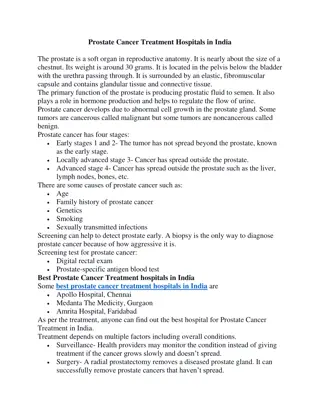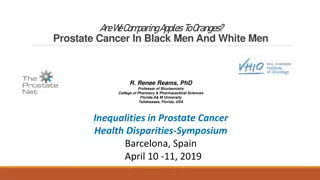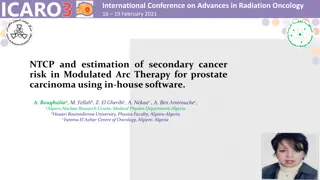Understanding Prostate Cancer in India
Prostate cancer is a significant health concern among men, characterized by abnormal cell growth in the prostate gland. This cancer can spread locally or metastasize, leading to different stages such as localized, locally advanced, and metastatic prostate cancer. Dr. Hiralal Chaudhari explains the current burden of prostate cancer in India and outlines the outcomes based on the extent of spread in the body. Knowing the stages of prostate cancer is crucial for early detection and appropriate management.
Download Presentation

Please find below an Image/Link to download the presentation.
The content on the website is provided AS IS for your information and personal use only. It may not be sold, licensed, or shared on other websites without obtaining consent from the author. Download presentation by click this link. If you encounter any issues during the download, it is possible that the publisher has removed the file from their server.
E N D
Presentation Transcript
Prostate Cancer in India By Dr. Hiralal Chaudhari M.B.B.S., D.N.B. (General Surgery) D.N.B. (Urology)
Prostate cancer Prostate cancer Prostate cancer is a cancer of the epithelium of the prostate gland-an organ of the male reproductive system, located below the bladder and in front of the rectum. It is defined by an abnormal proliferation of the cells Of the prostate gland epithelium) which have an abnormal tendency to break away from the parent tissue, spread to nearby (such as bladder, rectum, pelvic floor, pol lymph nodes, etc.) or distant sites (mostly bones, also lungs, liver, etc.) having an overall weakening and destructive effect on the body. It usually occurs in older men
Current burden in India Current burden in India
Outcomes (End results) in prostate cancer as per the extent of its spread in the body and further progression Broad classification of prostate cancer as per the extent of spread through the patient s body Localized prostate cancer Locally advanced prostate cancer Metastatic prostate cancer
Localized prostate cancer Localized prostate cancer The cancer is confined within the prostatic capsule - in one or both lobes of the prostate gland.
Locally advanced prostate cancer Locally advanced prostate cancer The cancer breaches the prostatic capsule and invades adjacent organs such as bladder neck, seminal vesicle, rectum, adjacent muscles, pelvic wall and/or lymph nodes after breaking away from the prostate gland.
Metastatic prostate cancer Metastatic prostate cancer The cancer invades distant organs such as bones (spine, long bones, etc.), lung, liver, etc. after breaking away from the prostate gland and spreading via the blood stream. Prostate cancer has a strong tendency to metastasize to the bones. Locally advanced prostate cancer and metastatic prostate cancer together are called as advanced prostate cancer.
The picture of the disease stage at the time of The picture of the disease stage at the time of presentation to a doctor in India presentation to a doctor in India Stage-wise distribution of prostate cancer cases An Indian Study
What causes prostate cancer and what drives its progression? The process of prostate cancer growth and spread can be visualized as a process of 2 interdependent steps: a. Initiation of the cancer (Also called carcinogenesis b. Further growth and spread of prostate cancer
a. Initiation of the cancer (Also called carcinogenesis) This is because of damage to or mutation of the DNA inside the nucleus of prostate gland epithelial cell(s).
This could be spontaneous or due to a genetic predisposition (i.e. tendency) on account of:
Once initiated, the growth and spread of cancer cells is driven or promoted by the action of the male sex hormones called as androgens. This is natural because these cells are part of the male reproductive system whose structure and function is always supported by androgens - mainly testosterone The correct medical or scientific term for this process is "Androgen Receptor or AR signaling". This is because though testosterone, which is basically secreted by the testes (90% - 95%) and some other glands (adrenal glands: 5% - 10%), it ultimately needs to bind to the androgen receptor (located inside the prostate cancer cells) to carry out its action.























